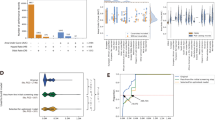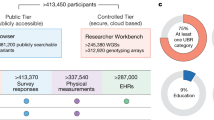Abstract
Background
Clinical variables—age, family history, genetics—are used for prostate cancer risk stratification. Recently, polygenic hazard scores (PHS46, PHS166) were validated as associated with age at prostate cancer diagnosis. While polygenic scores are associated with all prostate cancer (not specific for fatal cancers), PHS46 was also associated with age at prostate cancer death. We evaluated if adding PHS to clinical variables improves associations with prostate cancer death.
Methods
Genotype/phenotype data were obtained from a nested case–control Cohort of Swedish Men (n = 3279; 2163 with prostate cancer, 278 prostate cancer deaths). PHS and clinical variables (family history, alcohol intake, smoking, heart disease, hypertension, diabetes, body mass index) were tested via univariable Cox proportional hazards models for association with age at prostate cancer death. Multivariable Cox models with/without PHS were compared with log-likelihood tests.
Results
Median age at last follow-up/prostate cancer death was 78.0 (IQR: 72.3–84.1) and 81.4 (75.4–86.3) years, respectively. On univariable analysis, PHS46 (HR 3.41 [95% CI 2.78–4.17]), family history (HR 1.72 [1.46–2.03]), alcohol (HR 1.74 [1.40–2.15]), diabetes (HR 0.53 [0.37–0.75]) were each associated with prostate cancer death. On multivariable analysis, PHS46 (HR 2.45 [1.99–2.97]), family history (HR 1.73 [1.48–2.03]), alcohol (HR 1.45 [1.19–1.76]), diabetes (HR 0.62 [0.42–0.90]) all remained associated with fatal disease. Including PHS46 or PHS166 improved multivariable models for fatal prostate cancer (p < 10–15).
Conclusions
PHS had the most robust association with fatal prostate cancer in a multivariable model with common risk factors, including family history. Adding PHS to clinical variables may improve prostate cancer risk stratification strategies.
This is a preview of subscription content, access via your institution
Access options
Subscribe to this journal
Receive 4 print issues and online access
$259.00 per year
only $64.75 per issue
Buy this article
- Purchase on Springer Link
- Instant access to full article PDF
Prices may be subject to local taxes which are calculated during checkout
Similar content being viewed by others
Data availability
Prostate Cancer Association Group to Investigate Cancer Associated Alterations in the Genome (PRACTICAL) Consortium data are available upon request to the Data Access Committee (http://practical.icr.ac.uk/blog/?page_id=135). Questions and requests for further information may be directed to PRACTICAL@icr.ac.uk.
Code availability
Code used for this work is stored in an institutional repository and will be shared upon request to the corresponding author.
References
Torre LA, Bray F, Siegel RL, Ferlay J, Lortet-Tieulent J, Jemal A. Global cancer statistics, 2012. CA Cancer J Clin. 2015;65:87–108. https://doi.org/10.3322/caac.21262.
Seibert TM, Fan CC, Wang Y, Zuber V, Karunamuni R, Parsons JK, et al. Polygenic hazard score to guide screening for aggressive prostate cancer: development and validation in large scale cohorts. BMJ. 2018;360:1–7. https://doi.org/10.1136/bmj.j5757.
Shoag JE, Nyame YA, Gulati R, Etzioni R, Hu JC. Reconsidering the trade-offs of prostate cancer screening. N Engl J Med. 2020;382:2465–8. https://doi.org/10.1056/NEJMsb2000250.
Loeb S, Lilja H, Vickers A. Beyond prostate-specific antigen: utilizing novel strategies to screen men for prostate cancer. Curr Opin Urol. 2016;26:459–65. https://doi.org/10.1097/MOU.0000000000000316.
Ström P, Nordström T, Aly M, Egevad L, Grönberg H, Eklund M. The Stockholm-3 model for prostate cancer detection: algorithm update, biomarker contribution, and reflex test potential. Eur Urol. 2018;74:204–10. https://doi.org/10.1016/j.eururo.2017.12.028.
Steinberg GD, Carter BS, Beaty TH, Childs B, Walsh PC. Family history and the risk of prostate cancer. Prostate. 1990;17:337–47. https://doi.org/10.1002/pros.2990170409.
Bratt O, Drevin L, Akre O, Garmo H, Stattin P. Family history and probability of prostate cancer, differentiated by risk category: a Nationwide Population-Based Study. J Natl Cancer Inst. 2016;108:djw110. https://doi.org/10.1093/jnci/djw110.
Rawla P. Epidemiology of prostate cancer. World J Oncol. 2019;10:63–89. https://doi.org/10.14740/wjon1191.
Baquet CR, Horm JW, Gibbs T, Greenwald P. Socioeconomic factors and cancer incidence among blacks and whites. J Natl Cancer Inst. 1991;83:551–7. https://doi.org/10.1093/jnci/83.8.551.
Albright F, Stephenson RA, Agarwal N, Teerlink CC, Lowrance WT, Farnham JM, et al. Prostate cancer risk prediction based on complete prostate cancer family history. Prostate. 2015;75:390–8. https://doi.org/10.1002/pros.22925.
Giri VN, Beebe-Dimmer JL. Familial prostate cancer. Semin Oncol. 2016;43:560–5. https://doi.org/10.1053/j.seminoncol.2016.08.001.
Zhao J, Stockwell T, Roemer A, Chikritzhs T. Is alcohol consumption a risk factor for prostate cancer? A systematic review and meta-analysis. BMC Cancer. 2016;16:845. https://doi.org/10.1186/s12885-016-2891-z.
Giovannucci E, Liu Y, Platz EA, Stampfer MJ, Willett WC. Risk factors for prostate cancer incidence and progression in the health professionals follow-up study. Int J Cancer. 2007;121:1571–8. https://doi.org/10.1002/ijc.22788.
Witte JS. Personalized prostate cancer screening: Improving PSA tests with genomic information. Sci Transl Med. 2010;2:62ps55. https://doi.org/10.1126/scitranslmed.3001861.
Taylor RA, Fraser M, Rebello RJ, Boutros PC, Murphy DG, Bristow RG, et al. The influence of BRCA2 mutation on localized prostate cancer. Nat Rev Urol. 2019;16:281–90. https://doi.org/10.1038/s41585-019-0164-8.
Huynh-Le M-P, Fan CC, Karunamuni R, Martinez ME, Eeles RA, Kote-Jarai Z, et al. Polygenic hazard score is associated with prostate cancer in multi-ethnic populations. Nat Commun. 2021;12:1236. https://doi.org/10.1038/s41467-021-21287-0.
Karunamuni R, Huynh-Le M-P, Fan C, Thompson W, Eeles R, Kote-Jarai Z, et al. African-specific improvement of a polygenic hazard score for age at diagnosis of prostate cancer. Int J Cancer. 2020. https://doi.org/10.1002/ijc.33282.
Discacciati A, Orsini N, Andersson S-O, Andren O, Johansson J-E, Mantzoros CS, et al. Coffee consumption and risk of localized, advanced and fatal prostate cancer: a population-based prospective study. Ann Oncol. 2013;24:1912–8. https://doi.org/10.1093/annonc/mdt105.
Rylander-Rudqvist T, Håkansson N, Tybring G, Wolk A. Quality and quantity of saliva DNA obtained from the self-administrated oragene method—a pilot study on the cohort of Swedish men. Cancer Epidemiol Biomark Prev. 2006;15:1742–5. https://doi.org/10.1158/1055-9965.EPI-05-0706.
Karunamuni RA, Huynh-Le M-P, Fan CC, Eeles RA, Easton DF, Kote-Jarai ZS, et al. The effect of sample size on polygenic hazard models for prostate cancer. Eur J Hum Genet. 2020. https://doi.org/10.1038/s41431-020-0664-2.
Abdel-Rahman O. Prostate cancer incidence and mortality in relationship to family history of prostate cancer; findings from the PLCO Trial. Clin Genitourin Cancer. 2019. https://doi.org/10.1016/j.clgc.2019.05.015.
Therneau TM, Li H. Computing the Cox model for case cohort designs. Lifetime Data Anal. 1999;5:99–112. https://doi.org/10.1023/A:1009691327335.
Schumacher FR, Al Olama AA, Berndt SI, Benlloch S, Ahmed M, Saunders EJ, et al. Association analyses of more than 140,000 men identify 63 new prostate cancer susceptibility loci. Nat Genet. 2018;50:928–36. https://doi.org/10.1038/s41588-018-0142-8.
Karunamuni RA, Huynh-Le M-P, Fan CC, Thompson W, Eeles RA, Kote-Jarai Z, et al. Additional SNPs improve risk stratification of a polygenic hazard score for prostate cancer. Prostate Cancer Prostatic Dis. 2021:1–10. https://doi.org/10.1038/s41391-020-00311-2.
Wolf AMD, Wender RC, Etzioni RB, Thompson IM, D’Amico AV, Volk RJ, et al. American Cancer Society Guideline for the early detection of prostate cancer: update 2010. CA Cancer J Clin. 2010;60:70–98. https://doi.org/10.3322/caac.20066.
Goldgar DE, Easton DF, Cannon-albright LA, Skolnick MH. Systematic population-based assessment of cancer risk in first-degree relatives of cancer probands. J Natl Cancer Inst. 1994;86:1600–8. https://doi.org/10.1093/jnci/86.21.1600.
Rodriguez C, Calle EE, Miracle-McMahill HL, Tatham LM, Wingo PA, Thun M, et al. Family history and risk of fatal prostate cancer. Epidemiology. 1997;8:653–7. https://doi.org/10.1097/00001648-199710000-00007.
Hemminki K. Familial risk and familial survival in prostate cancer. World J Urol. 2012;30:143–8. https://doi.org/10.1007/s00345-011-0801-1.
Barber L, Gerke T, Markt SC, Peisch SF, Wilson KM, Ahearn T, et al. Family history of breast or prostate cancer and prostate cancer risk. Clin Cancer Res. 2018;24:5910–7. https://doi.org/10.1158/1078-0432.CCR-18-0370.
Adami HO, McLaughlin JK, Hsing AW, Wolk A, Ekbom A, Holmberg L, et al. Alcoholism and cancer risk: a population-based cohort study. Cancer Causes Control. 1992;3:419–25. https://doi.org/10.1007/BF00051354.
Brunner C, Davies NM, Martin RM, Eeles R, Easton D, Kote-Jarai Z, et al. Alcohol consumption and prostate cancer incidence and progression: a Mendelian Randomisation Study. Int J Cancer. 2017;140:75–85. https://doi.org/10.1002/ijc.30436.
Ratna A, Mandrekar P. Alcohol and cancer: mechanisms and therapies. Biomolecules. 2017;7. https://doi.org/10.3390/biom7030061.
Fall K, Garmo H, Gudbjörnsdottir S, Stattin P, Zethelius B. Diabetes mellitus and prostate cancer risk; a nationwide case-control study within PCBaSe Sweden. Cancer Epidemiol Biomark Prev. 2013;22:1102–9. https://doi.org/10.1158/1055-9965.EPI-12-1046.
Bonovas S, Filioussi K, Tsantes A. Diabetes mellitus and risk of prostate cancer: a meta-analysis. Diabetologia. 2004;47:1071–8. https://doi.org/10.1007/s00125-004-1415-6.
Beckmann K, Crawley D, Nordström T, Aly M, Olsson H, Lantz A, et al. Association between antidiabetic medications and prostate-specific antigen levels and biopsy results. JAMA Netw Open. 2019;2:e1914689. https://doi.org/10.1001/jamanetworkopen.2019.14689.
Hankinson SJ, Fam M, Patel NN. A review for clinicians: prostate cancer and the antineoplastic properties of metformin. Urol Oncol Semin Orig Investig. 2017;35:21–29. https://doi.org/10.1016/j.urolonc.2016.10.009.
NCCN Clinical Practice Guidelines in Oncology. Prostate Cancer. Version 1.2019.
NCCN Guidelines Version 1.2019 Older Adult Oncology. 2019.
Huynh-Le M-P, Fan CC, Karunamuni R, Walsh EI, Turner EL, Lane JA, et al. A genetic risk score to personalize prostate cancer screening, applied to population data. Cancer Epidemiol Biomark Prev. 2020;29:1731–8. https://doi.org/10.1158/1055-9965.epi-19-1527.
Huynh-Le MP, Myklebust TÅ, Feng CH, Karunamuni R, Johannesen TB, Dale AM, et al. Age dependence of modern clinical risk groups for localized prostate cancer—a population-based study. Cancer. 2020;126:1691–9. https://doi.org/10.1002/cncr.32702.
DeSantis CE, Siegel RL, Sauer AG, Miller KD, Fedewa SA, Alcaraz KI, et al. Cancer statistics for African Americans, 2016: progress and opportunities in reducing racial disparities. CA Cancer J Clin. 2016;66:290–308. https://doi.org/10.3322/caac.21340.
Funding
This study was funded in part by grants from the University of California (#C21CR2060), the United States National Institute of Health/National Institute of Biomedical Imaging and Bioengineering (#K08EB026503), the Research Council of Norway (#223273), KG Jebsen Stiftelsen, and South East Norway Health Authority. The content is solely the responsibility of the authors and does not necessarily represent the official views of any of the funding agencies, who had no role in the design and conduct of the study; collection, management, analysis, and interpretation of the data; preparation, review, or approval of the manuscript; and decision to submit the manuscript for publication.
Author information
Authors and Affiliations
Consortia
Corresponding author
Ethics declarations
Conflict of interest
TMS reports honoraria from Multimodal Imaging Services Corporation for imaging segmentation and honoraria from Varian Medical Systems and WebMD, Inc. for educational content. AMD has additional disclosures outside the present work: founder, equity holder, and advisory board member for CorTechs Labs, Inc.; advisory board member of Human Longevity, Inc.; recipient of nonfinancial research support from General Electric Healthcare. CCF is a scientific consultant for CorTechs Labs, Inc.
Ethics approval
All contributing studies were approved by the relevant ethics committees and performed in accordance with the Declaration of Helsinki; written informed consent was obtained from the study participants. The present analyses used de-identified data from the PRACTICAL consortium and have been approved by the review board at the corresponding authors’ institution.
Additional information
Publisher’s note Springer Nature remains neutral with regard to jurisdictional claims in published maps and institutional affiliations.
Rights and permissions
About this article
Cite this article
Huynh-Le, MP., Karunamuni, R., Fan, C.C. et al. Common genetic and clinical risk factors: association with fatal prostate cancer in the Cohort of Swedish Men. Prostate Cancer Prostatic Dis 24, 845–851 (2021). https://doi.org/10.1038/s41391-021-00341-4
Received:
Revised:
Accepted:
Published:
Issue Date:
DOI: https://doi.org/10.1038/s41391-021-00341-4
This article is cited by
-
PRState: Incorporating genetic ancestry in prostate cancer risk scores for men of African ancestry
BMC Cancer (2022)
-
Prostate cancer risk stratification improvement across multiple ancestries with new polygenic hazard score
Prostate Cancer and Prostatic Diseases (2022)



